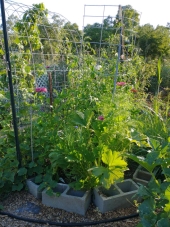
 1
1




 2
2




Visit Redhawk's soil series: https://permies.com/wiki/redhawk-soil
How permies.com works: https://permies.com/wiki/34193/permies-works-links-threads
 1
1




Jay Angler wrote:Welcome to Permies, Vanessa! Yes there's lots of info on permies and it's easy to feel overwhelmed. You're in a very different eco-system than I am, but your description of your new raised bed sounds like it has potential.
Was the oak punky or fairly fresh? Oak is generally a hard-wood, so it will take time to decompose and in the meantime will benefit from extra nitrogen which both urine and coffee grounds are known for. The plants will benefit from actual soil near the top to help anchor their roots, but if you have lots of leaves and they decompose fast enough in your climate, that might work. A secondary bin working as a worm compost might give you extra to add just before planting, as I suspect that you will find what you've got will settle a lot.
Good luck!
 2
2




Sometimes the answer is nothing

 2
2




Visit Redhawk's soil series: https://permies.com/wiki/redhawk-soil
How permies.com works: https://permies.com/wiki/34193/permies-works-links-threads




wayne fajkus wrote:I would get soil on there and plan to replenish it periodically. All that organic manure (hay, rabbit manure) is gonna decompose and shrink a lot, maybe exposing the logs. So add soil, and fill soil into holes that develop. I think soil has minerals that the other items lack. Although adding seawater would get those minerals in there also. Seawater is something in my arsenal because i have access to it and it is free.
Cardboard is something that is used to keep weeds from coming through. Mainly used when biulding a garden bed directly on the ground as a barrier. I would not think it needed in your case.
Back to the organic matter. I made a raised bed from 2x6s and filled it with decomposed horse manure. After 1 season that 5.5" of manure was maybe 1/2" deep. It was pretty amazing. So plan for additions. There was speculation and debate here as far as how much volume is lost when making compost. The guesses were in the range of 50 to 90%.i think Pauls prediction was at 90%.




Jay Angler wrote:You mention access to biochar. Is this already microorganism inoculated? If so, it would be good to tuck down into holes around the wood to hold nutrients in your climate, which I've read tends to cycle dead material fairly quickly. If it is "raw" biochar, I'd suggest that when you harvest material from your worm bin, you put the biochar in there to soak up all the microorganisms that the worms poop out, and then add it from there to your new bed. Either way, a little biochar would keep nutrients from leaching.
Wayne Fajkus is totally right - this bed is going to settle a lot, and keep settling. If you don't want to have to buy too much soil, you will have to keep your worms busy producing material to top up the bed. I'm told that worms adore chopped up cardboard - they like the glue - but there are people concerned about toxic chemicals in cardboard also. You will need to keep you eyes out for good, high carbon worm feed-stocks like dead leaves. Being further north than you, this is the "season of leaves" but it takes time to rake and places to stock pile them.
 1
1




Jay Angler wrote:You mention access to biochar. Is this already microorganism inoculated? If so, it would be good to tuck down into holes around the wood to hold nutrients in your climate, which I've read tends to cycle dead material fairly quickly. If it is "raw" biochar, I'd suggest that when you harvest material from your worm bin, you put the biochar in there to soak up all the microorganisms that the worms poop out, and then add it from there to your new bed. Either way, a little biochar would keep nutrients from leaching.
A build too cool to miss:Mike's GreenhouseA great example:Joseph's Garden
All the soil info you'll ever need:
Redhawk's excellent soil-building series






 2
2




Some places need to be wild
 1
1




 and hopelly 3 chickens [still talking hubby into it- and i want 2 ducks. we'll see])
and hopelly 3 chickens [still talking hubby into it- and i want 2 ducks. we'll see])

|
Of course, I found a very beautiful couch. Definitely. And this tiny ad:
Our PIE page has been updated, anybody wanna test?
https://permies.com/t/369340/PIE-page-updated-wanna-test
|





